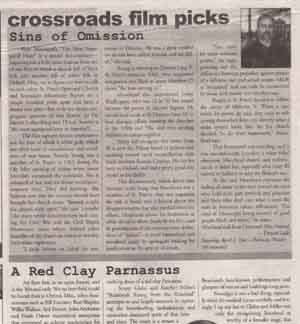 |
Crossroads film picks – Sins of Omission by Donna Ladd
March 31-April 6, 2005 issue of the Jackson Free Press
Kent Moorhead's "The Most Segregated Hour" is a special documentary-requiring
just a little more than an hour out of our lives to watch a church full
of black folk and another full of white folk in Oxford, Miss., try to
figure out how to talk to each other. St. Peter's Episcopal Church and
Secondary Missionary Baptist are a couple hundred yards apart and have
a shared race past-but with too many congregants ignorant of that history
(as Dr. Martin Luther King said, 11 a.m. Sunday is "the most segregated
hour in America").
The film captures honest emotions-not the least of which is white guilt,
which too often leads to complacency and avoidance of race issues. Patricia
Young was a member of St. Peter's in 1962 during the Ole Miss uprising
of whites when James Meredith integrated the university. She is ashamed
of her, and her fellow worshipers', response then. They did nothing. She
believes now that the incident should have brought her church closer.
"Instead, it split the church wide open," she said. Literally.
Like many white denominations both during the Civil War and the Civil
Rights Movement, some whites formed other branches of the church in which
to worship their white supremacy.
"I truly believe we failed the test, except in Duncan. He was a great
symbol we should have rallied around, and we didn't," she said.
Young is referring to Duncan Gray II, St. Peter's rector in 1962, who
supported integration and liked to quote Matthew 25 about "the least
among us."
Moorhead also interviewed Leroy Wadlington, who was 12 in '62 but would
become the pastor of Second Baptist. He would later work with Duncan Gray
III to host dialogue efforts between the churches in the 1980s and '90s,
and even sending children to camps together.
Many will recognize this name: Gray III is now the Bishop based in Jackson
and working toward racial reconciliation with black minister Ronnie Crudup.
He cut his teeth in Oxford, and had a pretty good role model in his daddy.
This documentary, which delves into intimate verité being that
Moorhead was a member of St. Peter's, does not sugarcoat the task at hand,
and is honest about the disappointments that also resulted from the efforts.
Moorhead allows his frustration at white denial to show clearly in the
film, and he provides one of the most succinct definitions of "racism"-a
word bastardized and trivialized today by apologists looking for justification
in the actions of others.
"You can't be racist without power," he says, pointing out the
difference between prejudice against people of a different race and actual
racism, which is "structural" and can only be committed by those
with power over another race.
People at St. Peter's decided to follow the advice of Malcolm X: When
a race holds the power, he said, they need to talk among themselves first-to
identify what a racist system looks like. So, his church decided "to
do their homework," Moorhead says.
That homework was revealing, and it was uncomfortable (comfort is white
folks' obsession, Moorhead shows), and unfortunately it didn't last, especially
after Gray III moved to Jackson to take the Bishop's seat.
At the end, Moorhead expresses the feeling of many in the state toward
the ones who hold onto past symbols and practices and fears, who don't
care what it costs the state in resources, talent, self-esteem. "I'm
tired of Mississippi being drained of good people black and white,"
he states.
Moorhead will be at Crossroads Film Festival.
Saturday, April 2, 1pm - Parkway Theatre
(68 minutes)
|








